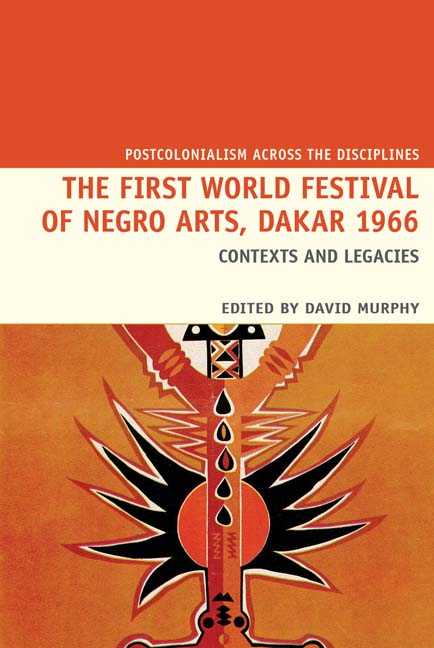Introduction. The Performance of Pan-Africanism: Staging the African Renaissance at the First World Festival of Negro Arts
Summary
We deeply appreciate the honor that devolves upon us at the First World Festival of Negro Arts to welcome so many talents from the four continents, from the four horizons of the spirit. But what honors us most of all and what constitutes your greatest merit is the fact that you will have participated in an undertaking much more revolutionary than the exploration of the cosmos: the elaboration of a new humanism which this time will include the totality of humanity on the totality of our planet Earth.
President Léopold Sédar Senghor, opening address at the festival colloquium, 30 March 1966, ‘The Function and Meaning of the First World Festival of Negro Arts’ (1966b): 5There had never been anything quite like it…
On 30 March 1966, the Senegalese poet-president Léopold Sédar Senghor ascended the steps of the National Assembly in Dakar, which stands at the heart of the Plateau, the gleaming white city built by the French colonial authorities at the start of the twentieth century to act as the administrative centre of its vast West African Empire. Senegal had freed itself from French colonial rule in 1960, and here it was, just six years later, proclaiming itself temporary capital of black civilization at the launch of the First World Festival of Negro Arts. The festival proper would not begin for two days. Senghor was in fact at the National Assembly to launch a colloquium on ‘The Function of Negro Art in the Life of and for the People’, which would run from 30 March to 8 April. That Senegal should hand over its legislative chamber for more than a week to writers, performers, artists and scholars to discuss the significance of art in the emerging post-imperial world was entirely in keeping with the central role that Senghor attributed to culture and the arts. Culture was not merely rhetorically significant, for Senghor apparently backed up his words with hard cash: various sources estimate that up to 25 per cent of the national budget was devoted to the arts in the early years after independence (see Harney 2004: 49).
- Type
- Chapter
- Information
- The First World Festival of Negro Arts, Dakar 1966Contexts and legacies, pp. 1 - 52Publisher: Liverpool University PressPrint publication year: 2016



